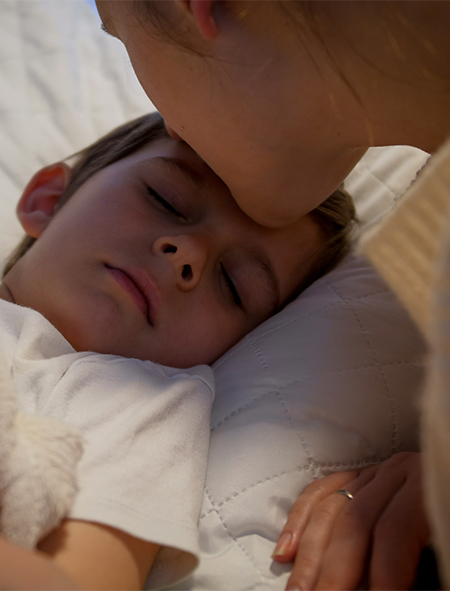 “I’m scared of the dark, mom,” your toddler says.
“I’m scared of the dark, mom,” your toddler says.
You reach down and ask them why they are scared and anxious.
You let them know you are with them.
You may crawl in bed next to them to comfort them.
You hold them if they need it.
Your child tells you why they’re anxious: It’s the dark shadows on the walls. They can’t get them out of their head even when they close their eyes.
Developmentally, they’re as afraid of the fictitious shadow predator on their wall as they would be of a real predator.
But you know this anxiety is irrational, so you pull out all your tricks to make them feel safe. You flip on the lights to help them rationalize their fear, turn on a nightlight so that the shadows aren’t as prominent, sing a melody, or take them back to your bedroom.
 Fast-forward. It’s months later… at 2 am…
Fast-forward. It’s months later… at 2 am…
… and you’re lying in YOUR bed.
Your fears and anxiety are VERY real: bills, to-do lists, and worries about your adult world.
You’re in the same situation as your toddler months ago. Your anxiety and fear don’t know there isn’t a real-life predator in your room.
But your body thinks there is.
Your body becomes anxious.
Your heart rate increases.
Your mind takes you into a fight-or-flight state, preparing you to respond to all these worries.
Why do we stop asking for help?
When we are children, we learn to ask for help until we learn to figure it out and deal with it independently. That’s when we start trapping the emotions in our bodies.
When did this happen to you?
When did you stop asking for help?
When did we as a culture start ignoring it’s NATURAL to look to others for support when we have these emotions?
Instead, we just lie there in our anxiety, thinking and meditating… HOPING that it goes away.
 Wouldn’t it help to see our emotions as another part of us?
Wouldn’t it help to see our emotions as another part of us?
After all, they’re born out of our DNA and were passed down to us from our ancestors, just like our hair, freckles, or dimples!
Our emotions (including anxiety and depression) are a natural part of our lives and monthly cycles.
As women, we teach our young girls to prepare for fluctuating hormones and moods. As we age, that emotional cycle may change, affecting our sleep, mood, and physical well-being.
Then, on top of that, we have work, family, friends, and community. We keep going even when we feel these symptoms throughout the month. We learn to “deal” with them.
We often “deal” with anxiety and depression in the same way. We’ve been culturally conditioned to keep going and going.
We wear our “everything is okay” mask 90% of the day because we’re taking care of others and don’t have the time to check in to see how we’re REALLY doing.
 Aren’t you ready to be seen and heard?
Aren’t you ready to be seen and heard?
“Okay, thanks for asking.” I imagine that’s what you usually say when someone asks how you’re doing.
But wouldn’t it be nice to answer that question from the heart?
In therapy, I’ll ask you that question. And here, you’re free to be authentic:
“The news I heard today is so depressing.”
“Thinking about the future is making me anxious.”
“I couldn’t fall asleep last night because I couldn’t stop thinking.”
“I don’t feel like doing anything today.”
“I’m mentally exhausted.”
“I have been on the verge of tears all day.”
Until emotions are expressed, the depressive and anxious feelings stay trapped, waiting for a safe place to release them.
Come. Express yourself. I’m here for you.
Call me today for your free consultation. Let’s talk about it: (925) 281-3520.

